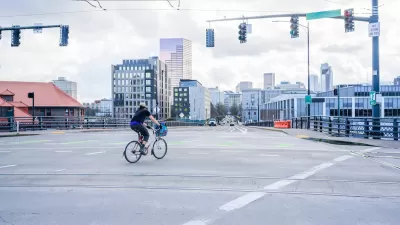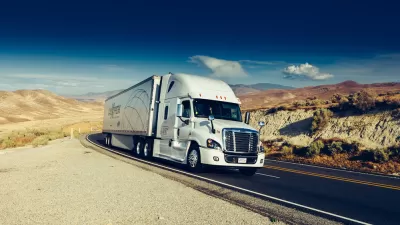Josh Barro offers his take on the charge, oft resorted to by transit advocates, that subsidies for road maintenance encourage driving. Instead, he argues, we should turn our attention to the mechanisms that make it hard for transit to compete.
For anyone interested in changing to status quo, it can help to take a closer look at the things we don't even realize we're paying for. In that tradition, transit advocates have made remarkable headway in recent years, identifying subsidies that the general public pays to make it easier to get around on four wheels. From free parking to road repair, cities go to great lengths to clear obstacles for the automobile.
But Barro offers a sobering rebuttal for those who argue that such incentives are standing in the way of the widespread acceptance of transit: between public transit and the automobile, the former depends far more heavily on general subsidies than the latter. In his estimation, only 8 percent of the overall cost of driving is subsidized by general revenue (i.e. not just drivers), whereas transit systems in Milwaukee and Madison, for instance, rely on such subsidies for 65 to 74 percent of their budgets.
"If you ended road subsidies," Barro offers, "people would drive
less – but probably not much less. Gasoline prices would go up by about
50 to 60 cents a gallon, but over the last decade, fuel prices rose
more sharply than that without triggering any major change in our
transportation practices."
The real battle for transit advocates, then, boils down to land use: "Cities impose barriers to density that limit the number of housing units
and offices that can be located near buses and trains, which reduces
mass-transit usage."
FULL STORY: Don't blame cars for the shortcomings of mass transit

Planetizen Federal Action Tracker
A weekly monitor of how Trump’s orders and actions are impacting planners and planning in America.

Chicago’s Ghost Rails
Just beneath the surface of the modern city lie the remnants of its expansive early 20th-century streetcar system.

San Antonio and Austin are Fusing Into one Massive Megaregion
The region spanning the two central Texas cities is growing fast, posing challenges for local infrastructure and water supplies.

Since Zion's Shuttles Went Electric “The Smog is Gone”
Visitors to Zion National Park can enjoy the canyon via the nation’s first fully electric park shuttle system.

Trump Distributing DOT Safety Funds at 1/10 Rate of Biden
Funds for Safe Streets and other transportation safety and equity programs are being held up by administrative reviews and conflicts with the Trump administration’s priorities.

German Cities Subsidize Taxis for Women Amid Wave of Violence
Free or low-cost taxi rides can help women navigate cities more safely, but critics say the programs don't address the root causes of violence against women.
Urban Design for Planners 1: Software Tools
This six-course series explores essential urban design concepts using open source software and equips planners with the tools they need to participate fully in the urban design process.
Planning for Universal Design
Learn the tools for implementing Universal Design in planning regulations.
planning NEXT
Appalachian Highlands Housing Partners
Mpact (founded as Rail~Volution)
City of Camden Redevelopment Agency
City of Astoria
City of Portland
City of Laramie





























